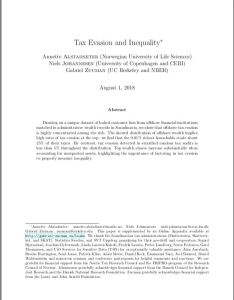Melden Sie sich bei getAbstract an, um die Zusammenfassung zu erhalten.

Melden Sie sich bei getAbstract an, um die Zusammenfassung zu erhalten.
Annette Alstadsæter, Niels Johannesen and Gabriel Zucman
Tax Evasion and Inequality
University of California, Berkeley, 2017
Was ist drin?
Wealthy taxpayers’ use of offshore accounts increases inequality and reduces government revenue.
Recommendation
Politicians decry the inequality gap between the wealthy and the vast majority of income earners. But according to this erudite report by professors Annette Alstadsæter, Niels Johannesen and Gabriel Zucman, one reason the rich are growing richer is tax evasion. The authors uncover substantial evidence, some of it from the leaked Panama Papers, that wealthy individuals are fairly aggressive in their tax evasion schemes. The researchers advise public authorities to target these activities to improve income inequality while rectifying tax revenue imbalances.
Summary
About the Authors
Annette Alstadsæter is a professor at the Norwegian University of Life Sciences. Niels Johannesen is a professor at the University of Copenhagen. Gabriel Zucman is an assistant professor at the University of California, Berkeley.
























Comment on this summary